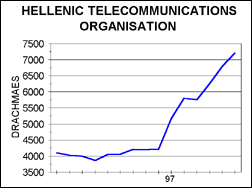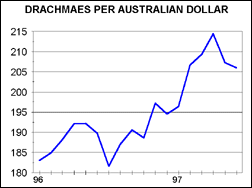International Policy
Economy
Life
Science
Culture
Hellenism
![[The HR-Net Forum]](/forum/images/forum.gif)
HR-Net Home
Latest News
News Archive
Documents
Interesting Nodes
Web Pages
Mirrored Sites
PNP
PNP-Online
News Searches
Info
HRI
What's New
Using Greek
Usage Statistics
Feedback
UPDATE ON THE GREEK ECONOMY
By Akis Haralambopoulos <akis@innocent.com>Hellenic Council of New South Wales, Australia
20th June 1997
The Greek economy has continued to post impressive economic achievements. Investors in Greek bond and share markets are enjoying substantial capital gains. Overseas investors are also benefiting while being exposed to limited losses through any potential weakening of the Greek currency. One of the main driving forces behind the capital gains being made in Greece is the vast improvement in inflation which continues to fall markedly. Consumer prices for May are now only 5.4% higher than a year ago while wholesale price inflation is a mere 2.5% higher in annual terms. Greece's consumer price inflation is the lowest it has been since July 1972. The immediate outlook is for annual inflation to be under 4 1/2% by early 1998.
The phenomenal size of capital gains experienced in Greece need to be highlighted for those that have never thought of Greece as a financial investment. In recent months there has been a noticeable increase in the number of international stockbroking houses recommending that investors look closely to investing in Greek bonds as well as Greek shares. The re-focusing on Greece is understandable given the progress that the current and especially made towards meeting European Convergence targets. The current government has followed the policies initiated in large part by the previous New Democracy Government.
The Athens Stock Exchange has rallied immensely. The local Greek investors moved to the stock market en mass as a result of the sale of government business utilities most notably the Hellenic Telecommunications Organisation (OTE) and the fact that investing in property is no longer the preferred medium of investment in a declining inflation environment.

More importantly, consistent economic policies being pursued by a credible Prime Minister Simitis and a clear and determined effort to meet European Convergence targets have led to international investors buying financial assets in Greece. Greek financial markets are also losing their image of antiquated paper based trading. This has been the result of financial reforms implemented in the last five years. This has eroded a feeling amongst international investors that the Greek Stock exchange was mostly for "cowboys".
As a result the Athens Stock Exchange Composite Index has appreciated by almost 80% to early June from a year ago. This performance makes the Athens Stock exchange one of the best performing equity markets in the industrialised world and amongst emerging markets.
One of the most interesting share investments has been the Hellenic Telecommunications Organisation (OTE). The proceeds from the sale of OTE are being used to reduce the government deficit while Greeks and international investors secure a share in one of Greece's largest business enterprises. Eight percent of OTE was floated in April 1996 raising Dr 128 billion for the Greece and a further 12% will be sold in June 1997. OTE has proved to be a very good investment. OTE will continue to benefit from a monopoly in telecommunications for a few remaining years and has recently been expanding it's operations throughout the Balkans. OTE has shaped up as the preferred "blue-chip" investment amongst Greek and non-resident investors. OTE has appreciated some 76% since first listed in April 1996. OTE is a major listed company which has shown remarkable appreciation. However, a whole variety of companies have shown even more impressive results.

Capital gains have not been limited to shares. Investors investing in government bonds have also benefited. Falling yields (capital gains occur when yields fall ie., prices rise) and hence larger profits have been significant in recent years.
Those deterred from investing in Greece by the possibility that a depreciation of the drachmae against their foreign currency will see their profits disappear should take note that currencies are volatile and this can happen irrespective of where you invest. Currency volatility is unavoidable and can result in additional profits if the Drachmae strengthens or a loss if the drachmae weakens.
Current government policy is based on a "Hard Drachmae" Policy. This has involved the Greek Government ensuring the Drachmae weakens less than the rate of inflation. The government has performed well on this policy objective. The result has been downwards pressure has been placed on domestic inflation and perceptions of imported inflation have been contained.
From an investors point of view this has meant that the appreciation of their investments can swamp the mild weakening of the Drachmae. In overall terms, in the foreign investors currency, a handsome capital appreciation remains.

An Australian investor investing in Greece at say the start of 1996 would have seen the weakening of the Drachmae against the Australian dollar reduce the value of an investment in Greece by around 10 per cent. However, the foreign exchange loss would have been overwhelmed by the capital appreciation in Drachmae terms. Overall, an investor, say in OTE would have done quite well in Australian dollar terms.
All overseas investments, irrespective of which currency they are made in, are subject to the gyrations of foreign exchange markets.
The recent performance of Greek financial markets and the clear determination on the part of policy markets for Greece to meet European Economic Convergence targets suggests that investors should think about investing in Greece as a another avenue of wealth creation.
Disclaimer: The author has shares in a number of companies listed on the Athens Stock Exchange. This article can not be relied upon for independant investment advice.